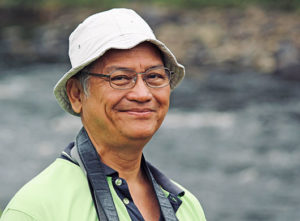Seacology Prize winner: conservation depends on indigenous land rights
Respect for the rights and traditions of indigenous island communities has been at the heart of Seacology’s approach to conservation since our founding project in Samoa. We know that supporting indigenous peoples’ efforts to protect their traditional lands and waters is not only the right thing to do, but effective from a long-term conservation perspective.
Malaysian activist Peter Kallang received the 2019 Seacology Prize for leading a long and ultimately successful grassroots campaign to stop a mega-dam on the island of Borneo. The dam, supported by outside interests, would have displaced thousands of indigenous people and flooded vibrant rainforests.

Photo by Fiona McAlpine/The Borneo Project
Kallang recently participated in the launch of a new report from the Rights and Resources Initiative, a coalition of indigenous-led organizations, that highlights the crucial role indigenous people play in conservation. The report points out that a staggering 80% of the world’s remaining biodiversity and 36% of the world’s intact forests are found within indigenous territories. It also warns that top-down, space-based conservation schemes risk disenfranchising indigenous people, and jeopardizing their sovereignty and human rights. It concludes that an inclusive, rights-based approach is necessary not only to avoid these outcomes, but to protect biodiversity and meet the world’s climate and conservation goals.
Kallang recently discussed his perspective with environmental news outlet Mongabay.
“Because of the deep connection of our people to our land and territories, we conserve an outsized proportion of the world’s biodiversity and ecosystems through our governance system and cultural practices,” Kallang told Mongabay. “Caring for and sustaining our territories is part of our identity, part of our customary laws and values, and part of our way of life.”

